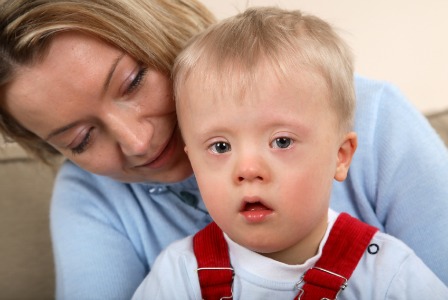
Duke University has launched a study aimed at gathering parents’ experiences with prenatal testing and receiving a prenatal diagnosis of Down syndrome .
Uncovering informational, emotional needs
The study is open to parents currently expecting a child with Ds, and parents who have previously received the prenatal diagnosis and have a child with Ds now.
As parent to a toddler with Ds, I wanted to participate in this study from the moment I heard it existed.
My husband and I had experienced a range of emotions as we went through genetic testing leading up to a prenatal diagnosis of Ds for our son, Charlie, who is now two years old.
We had powerfully positive and powerfully negative interactions throughout the process, and participating in the study felt like my little way of helping out the next parents blindsided by an unexpected diagnosis.
An unexpected discovery
Why was it unexpected? Well, does anyone really consider that their unborn child might have a chromosomal abnormality before they've even started genetic testing?
It seems the more common reaction to discovering a pregnancy is fear of the unknown, along the lines of being clueless about potty training and diaper changing.
Rarely will a newly pregnant woman spend time considering how she may one day learn American Sign Language to communicate with a child who has speech delays.
And while it's possible, it seems unlikely for a newly pregnant woman to fully understand and look forward to discovering an entire community of supportive, unconditionally loving people who understand her range of emotions.
Medical community influence
The truth is, no matter how educated, informed, loving, open-minded or religious you may be, discovering that your unborn child has a health problem will take your breath away.
The team beside you during such an emotional, unchartered journey can have tremendous influence. In our case, we were so thankful for the calm, measured assurances from our physician. He prepared us before we had a diagnosis.
Alternately, we came away from every meeting with our genetic counselor feeling stressed and misunderstood. She meant well — we never questioned her compassion. But she always had an air of sadness when she spoke with us. Her voice mails were never neutral. We knew the news wasn't what we had hoped to hear, and we still had to call her back.
The idea that a survey of such experiences might help change experiences for future parents motivated me to complete it.
Survey details
The survey took about 30 minutes to complete and sparked a nostalgic conversation with my husband. We received our unborn son’s Down syndrome diagnosis on January 27, 2010. We were to be married on January 30. I remember the details of our ultrasounds as vividly as the details of our wedding.
we survived."
We struggled, and we survived. Parenthood will do that to you. Marriage can do that too!
Was it hard to relive those memories? Not really. Today, we have the benefit of being able to look down at the monitor and see our beautiful sleeping boy. He is worth any moment of fear, angst or self-doubt I ever experienced.
Next generation of support, education
This survey could be pivotal in teaching a new generation of genetic counselors and physicians how to share unexpected news. Maybe it will help genetic counselors understand how to neutralize the downtrodden tone of their voices when leaving a message to “call me back, I have news to share.”
Whatever outcome, I believe this study is critical in helping educate the generation that will care for my daughter during whatever pregnancies she may be so blessed to have.
Genetic counselors lead study
Katie Sheets, MS, CGC and Blythe Crissman, MS, CGC at Duke University Medical Center received the 2013 Jane Engelberg Memorial Fellowship to conduct the study, titled: Response to genetic counseling: Understanding the experience and needs of individuals receiving a prenatal diagnosis of Down syndrome.
The anonymous survey is open until September 30, 2014, and can be accessed at obgyn.duke.edu/prenatalstudy.
Informational, emotional needs
The goal of this two-year exploratory study is to describe the experiences and understand the informational and emotional needs of patients receiving a prenatal diagnosis of Ds. The survey looks at parents’ decision-making throughout the pregnancy, according to Katie Sheets, MS, CGC, Duke University Medical Genetics.
“We hope to learn about the experiences of those making all available choices for pregnancy management,” Sheets said.
On the survey website, researchers share: “Participation will improve our knowledge and help us to provide appropriate information, resources, and support to individuals in similar situations. Sharing your journey could benefit other individuals or couples going through a similar experience in the future.”
Sharing results
While there’s no firm timeline planned to publish results, Sheets hopes to share preliminary results via abstracts and proposals at various professional and educational meetings/conferences.
“As part of this questionnaire, we also allow an opportunity for participants to provide contact information to participate in future research, as we are hoping to see the study into a phase 2, which will involve patient interviews,” Sheets added.
The study involves a one-time anonymous web-based questionnaire with web-consenting. Eligible participants include males and females who have received a prenatal diagnosis of Ds between 2013 and 2014. Patients who have received an earlier prenatal diagnosis of Ds who wish to share their story may also participate.
For more information about the study, contact Kathryn Sheets, 919-681-1984; or Blythe Crissman, 919-681-1976.
More about Down syndrome
Having a sibling with Down syndrome
Moms share favorite books on Down syndrome
What expecting moms should know about prenatal testing